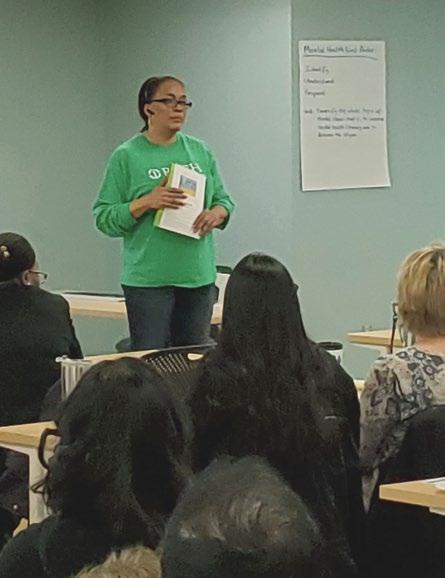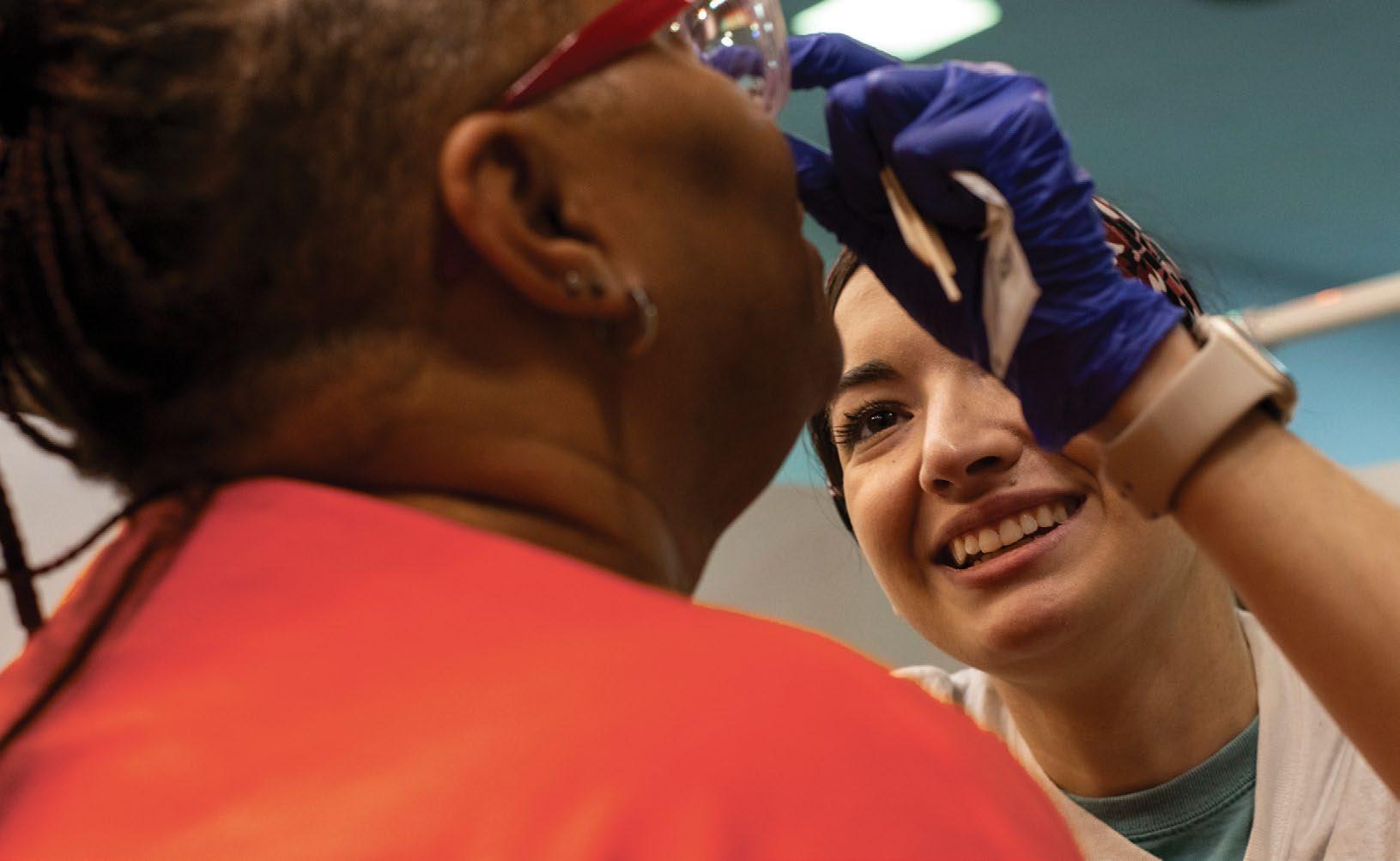


Advancing Health Equity for All
Rush University Medical Center and Rush Oak Park Hospital





Rush University Medical Center and Rush Oak Park Hospital

Rush University Medical Center and Rush Oak Park Hospital serve people in the following Chicago neighborhoods and western suburbs. Nearly 769,000 people live in this map area.
Archer Heights
Austin
Belmont Cragin
Berwyn
Brighton Park
East Garfield Park
Elmwood Park
Forest Park
Humboldt Park
Lower West Side
Near West Side
North Lawndale
Oak Park
River Forest
South Lawndale
West Garfield Park
West Town
Every year, we create a community benefit report, or CBR. It lists the ways nonprofit hospitals work to improve the health of their communities by providing free or discounted care, health education programs and other community services. Every nonprofit hospital in Illinois has to submit a detailed CBR to the Office of the Attorney General each year. This summary of Rush’s CBR for fiscal year 2024 uses information from that detailed CBR, which you can read at rush.edu/chna-cbr.
Rush’s annual CBRs show how we bring to life our Community Health Needs Assessment (CHNA) and Community Health Implementation Plan (CHIP). Every three years, we collect data and input from the community and develop a plan to address the key health issues stakeholders identify. You can read Rush’s most recent CHNA and CHIP at rush.edu/chna-cbr.

The Rush University System for Health (Rush) mission is to improve the health of the individuals and diverse communities we serve through the integration of outstanding patient care, education, research and community partnerships.
Rush’s goal is for everyone to have a fair and just opportunity to be as healthy as possible. That’s how we define health equity. And we’ll achieve health equity when everyone can thrive with dignity, justice and fairness so they and their families can attain the highest level of health.
Rush’s commitment begins with our belief that access to health care is a right. Our access and charity care policies reflect and reinforce this belief.
Along with addressing the individual needs of our patients and their families, we focus on improving neighborhood conditions. We understand that the
legacies of residential segregation, structural racism and poverty have produced large neighborhood life expectancy gaps, and in response we continue to advance strategies like direct neighborhood investments, local hiring, career pathways, support of local businesses and community partnerships.
We call this our Anchor Mission, as Rush has always been an anchor economic engine in our communities. The Anchor Mission approach goes beyond providing the highest-quality health care. As a leading health system, we view it as our obligation to invest in building blocks of health such as affordable housing, healthy food, good jobs and quality education. Our investment in the Sankofa Wellness Village in West Garfield Park and our partnership with Fillmore Linen in North Lawndale are examples of our commitment to neighborhood economic development as a foundation of health.
We know that achieving health equity is a big, bold goal. We partner with community members, nonprofits, other health care organizations and government agencies to create programs and services that support health, access and fairness. With four other health systems and community partners, we founded and support the West Side United health care collaborative, with the aim of eliminating the life expectancy gap on Chicago’s West Side. West Side United is recognized as an international model for fostering neighborhood health improvement and advancing health equity for all.
Our work is guided by the voices and leadership of the people who live, work, play and worship in the neighborhoods we serve. They’re the experts in their own experiences, and they shape our priorities for what we do in the community.
The following highlights in this community benefit report describe just a few of Rush’s efforts to improve the health of our communities during fiscal year 2024.

In fiscal year 2024, Rush University Medical Center and Rush Oak Park Hospital invested $654.3 million to benefit the community. This included $350.2 million in unreimbursed care.
Unreimbursed care includes charity care provided to patients who are uninsured or underinsured, payments that we’re unable to collect and our costs for providing care to Medicaid and Medicare patients.
We prevent and manage chronic conditions and risk factors.


10,000+ pounds of free meals go to community members each year.
The Food Surplus Project distributes unused food from Rush University Medical Center and Rush Oak Park Hospital to food pantries and other partners.
Food Is Medicine, Veggie Rx and the Emergency Department (ED) Pantry at Rush University Medical Center help patients who don’t have access to healthy food.
People who need it receive a box of food and can sign up for two more boxes delivered to their homes. Those who qualify are also connected with long-term food assistance like SNAP and Meals on Wheels.
3,000+ patients have received free, home-delivered healthy food to date.

Blood pressure screenings for community health, a Rush Oak Park Hospital partnership with Beyond Hunger, places hospital volunteers at food pantry sites. They take clients’ blood pressure and provide education about high blood pressure, or hypertension. Hypertension is one of the most common chronic conditions (conditions that go on for a long time and often don’t go away completely).
We increase access to mental and behavioral health services.


Outpatient mental health care is provided through the Department of Social Work and Community Health’s Mental Health Clinic.
11,901 therapy sessions took place in Rush’s community psychotherapy clinic and through partnerships with Rush specialty care providers.

Mental health screenings, evaluation and care are provided in Rush’s SchoolBased Health Centers (SBHCs), housed in Chicago Public Schools in underresourced neighborhoods.
1,526 students were screened for mental health issues and 454 received mental health services in SBHCs.
1,656 students received psychiatric services through a partnership with the Rush Department of Psychiatry.
Mental Health First Aid trains people to recognize signs and symptoms of mental health crises, respond when someone needs help and fight stigma around mental health issues.
25 training sessions educated 181 Rush staff and community members.
We improve the social factors that contribute to health inequities.

Screenings for the social drivers of health connect patients with resources that can help with housing, food, transportation, employment, mental health care and other needs.
104,384 screenings were completed at Rush University Medical Center.
The Rush Education and Career Hub (REACH), a cradle-to-career program, prepares underrepresented students for success in STEM and health care fields.
12,400 students, educators and community members participated in pipeline programs for learners from preschool to post-college.
409 high school and college students logged 20,000+ paid, workbased learning hours.
300 students in grades 2-12 attended two STEM Exploration Fairs at Malcolm X College.
The Center to Transform Health and Housing (CTHH) provides health care and support to people experiencing homelessness, works to end homelessness and supports the Chicago Homelessness and Health Response Group for Equity (CHHRGE).

We make health care education and training more affordable.
Rush provided tuition forgiveness of $1,798,056 for 58 students pursuing doctorates in health science research.


Tuition forgiveness programs subsidize the education and training of the next generation of doctors, nurses, other health care professionals and health care research scientists.
We improve economic health and well-being in our communities.

Rush University Medical Center spends millions of dollars annually on goods and services — and our Anchor Mission Strategy directs that spending power to boost economic vitality in historically disinvested West Side communities. In fiscal year 2024, we launched an innovative partnership with Fillmore Linen Services that created 175 stable, well-paying jobs for local residents while also reducing Rush’s laundry costs and environmental footprint.
We invest locally: Through the West Side United (WSU) collaborative, Rush contributes to grants for dozens of small businesses on Chicago’s West Side.
$1.99 million has been awarded in small business grants to date.
$10.1 million is actively invested with community development financial institutions (CDFIs) to support West Side social impact projects.
$6.48 million was loaned to local businesses by CDFI partners in fiscal year 2024.
We hire locally: Rush collaborates with community partners to hire West Side residents.
10,385 Rush employees have been hired from anchor mission communities since fiscal year 2021 — an average of 16% per year.
2,228 people — 17.4% of all new hires — were hired from anchor mission communities in fiscal year 2024.

We volunteer locally: Rush’s Employee Volunteer Program serves the communities where employees live and work.
367 employees volunteered 1,027 hours of time.

We purchase locally: Rush has partnered with the Healthcare Anchor Network and U3 Advisors to connect with and purchase from West Side businesses.
$13 million was spent with West Side vendors in fiscal year 2024. We also provided mentoring to help small vendors grow.


7,703 outreach activities included 5,825 screenings for social drivers of health.
The Community Health Worker (CHW) Hub bridges health care and social support systems by connecting people to essential resources and providing one-on-one help.
Rush@Home, a primary care house calls program, keeps patients healthy and comfortable at home with a visiting team of primary care providers, certified medical assistants, nurses and social workers.
The Transitional Care Program (TCP) at Rush University Medical Center helps patients without a primary care provider arrange follow-up appointments with CommunityHealth, Chicago’s largest free clinic. Rush University students also screen shelter residents and refer them to TCP.
681 patients were referred to CommunityHealth.
Adverse Child Experiences (ACEs) screening identifies pregnant and parenting people who have experienced childhood trauma and connects them with services such as home visiting programs and doula support.

Family Connects Chicago, housed in the Rush University College of Nursing Department of Academic Practice Nursing, supports families with newborns with home visits by nurses who offer a comprehensive family health check and screening for the social drivers of health.
960 families have been served to date, with 85% connected to resources.


At Rush, we believe that achieving health equity is not just something to aspire to — it’s a shared responsibility. Our partners bring expertise, leadership and insights that help all of us build meaningful solutions that nurture health, opportunity and resilience in our communities.
Together, we create locally driven, locally supported strategies for expanding the resources and opportunities that help achieve health equity. We’re building a future where everyone has the opportunity to thrive.

For more information on the community benefits provided by Rush, visit rush.edu/about-us/rush-community.
To make an appointment, call (888) 352-RUSH (7874).